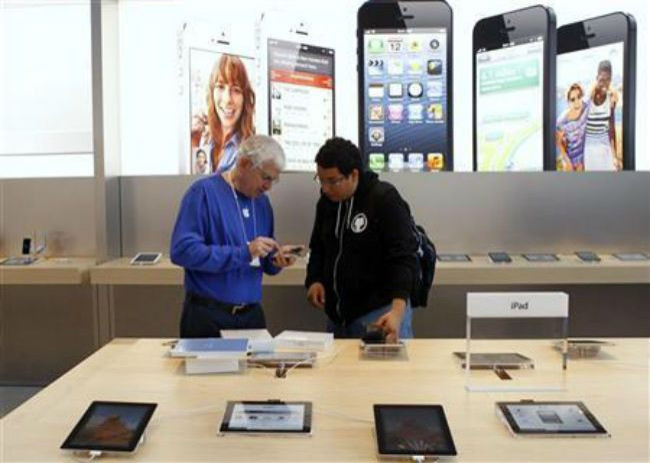
With the "fiscal cliff" looming, taxpayers are wringing their hands about all sorts of things. Income taxes might rise, dividends might get walloped, lifetime gift-tax exemptions might get slashed.
But when it comes to immediate impact on their wallets, maybe they should be thinking about something else entirely: The Apple tax.
Americans are shelling out big bucks annually to outfit the entire household with Apple products. And they are spending hundreds - if not thousands of dollars - more each year for the unexpected Apple "taxes" -- add-ons that lock them into the Apple system: iTunes downloads for music, movies and games, along with subscriptions and accessories.
Then there are the replacement costs for lost or broken equipment. For a family with multiple children, each with their own technological needs, the total annual bill can get downright ugly -- like going over a familial "fiscal cliff."
Just ask Sam Martorana. A human-resources specialist for the airline WestJet, Martorana's Vancouver household consists of three people and no less than nine Apple products. Between himself, husband Ron, and stepson Evan, they own three MacBooks, two iPhones, two iPads, and two iPods.
"Oh my God, do I have to total it all up?" asks Martorana, 40. "It's so depressing. I'd say we spent at least $5,000 on all that stuff, including $700 in the past year alone. I totally have a weakness. I fell in love, and that was it."
Martorana is hardly alone in forking over so much money to the tech juggernaut. In 2011, the average amount U.S. households spent on Apple products was $444, according to Morgan Stanley analyst Katy Huberty.
That figure has been rising smartly every year. In 2010 it was $295. Back in 2007, it was only $150.
And we might only be seeing the beginning. If Apple rolls out its own HDTV, as expected, Huberty sees annual Apple spending by households doubling, to $888 by 2015.
Apple products are a must-have this holiday season. A Reuters-Ipsos poll finds that one-third of consumers are thinking about buying a tablet computer - and most of them want an iPad or aniPad mini. About one-quarter of those polled say they'll cut back on other holiday purchases this year to afford these pricey gadgets.
The analogy of an Apple tax might sound facetious, but think about it. Median U.S. household income was $50,054 in 2011, according to the Census Bureau. That means a sizable chunk of that is getting diverted to Apple headquarters in Cupertino.
Remember, this is not something that consumers are being forced to pay. They are dipping willingly into their own pockets, because they're essentially slaves to the devices.
"For so many children, the acquisition of an iPad, iPhone or iTouch has replaced the first bicycle or the first driver's license," says Paco Underhill, founder of consulting firm Envirosell and author of several books on consumer behavior including "Why We Buy: The Science of Shopping."
"I have an image of the 9-year-old clutching his first phone like a teddy bear when he goes to sleep at night," he says. "I credit Apple with foresight to recognize what the connectivity process means to people. It's one of the few companies to understand that technology is no longer technology. It's an appliance."
Reno mom Jessica Torres is very familiar with those modern-day "appliances." In 2011 alone Torres' family splurged on a new iPhone, an iPad, an iMac, a MacBook, an iPod Touch (and bought her husband's mom an iPad for good measure).
With two daughters, age 3 and 9, Torres' purchases are likely to ramp up even more in years to come. "We easily spent over $5,000 last year on Apple products," says Torres, who runs the blog MyTimeAsMom.com. "We've sent them a lot of money over the years. I'm definitely an addict."
Customers like Torres are fueling Apple's eye-popping earnings, which were $8.2 billion for the fiscal fourth quarter. That was up from $6.6 billion a year earlier, and amazingly still qualified as a 'miss,' which demonstrates just how high expectations are for the company.
"People spend more and more as the products are perceived to be better and better," says Michael Gartenberg, research director at technology consulting firm Gartner. "Aspirational products tend to make more family members want to own, and that's why we see Apple products on so many holiday wish lists that are crossing age, gender and other demographics."
As for Martorana, his family's indentured servitude to Apple looks like it will continue indefinitely. He is looking to replace his MacBook with a newer model within a year or so, which he guesses will cost at least another $1,300. While he loves the products unreservedly, he sees no way out of the annual Apple tax.
"With my MacBook, iPad and iPhone, everything is linked," says Martorana, who laments that Apple products are so popular that they never seem to go on sale. "All of my music and photos are in their iCloud. So I don't know if I'd even be able to switch to another product, even if I wanted to. Apple definitely has its hooks in me."
© Thomson Reuters.




